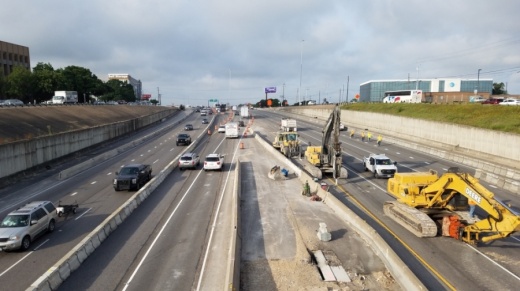“The commission feels like they have given us a great gift, and they probably have,” said Travis County Precinct 3 Commissioner Gerald Daugherty at the board’s April 6 meeting.
But while the local political leaders who make up the transportation planning organization agree the gift of improving I-35 through Austin is badly needed, the task of finding which already-funded projects to punt down the road in order to funnel money to I-35 has been contentious.
Austin Mayor Steve Adler said the process to choose some projects to defer and others to keep on schedule harkened back to the way CAMPO used to operate in years past, when decisions were made “on purely political considerations."
“We’re about to make decisions with respect to many hundreds of millions of dollars, and we’re making a decision that doesn’t seem to be based on any objective criteria,” Adler said during the April 6 meeting.
At CAMPO’s March 9 meeting, Texas Department of Transportation Austin District Engineer Tucker Ferguson provided a draft list of projects to maintain funding as well as projects to defer in order to free up the money for I-35. On April 6, the board discussed the list again, and on April 13 it is scheduled to take a vote.
The compressed timeline is based on the Texas Transportation Commission’s process to approve the entire $4.3 billion for the project in its 2020 Unified Transportation Plan—which outlines which state projects will get funding over the next 10 years. The commission could vote on the update as early as April 30.
“It’s certainly not my choice or anybody’s choice to make these decisions in the short time frame we have, but we are there,” said CAMPO board chair Cynthia Long.
Officials such as Adler, Travis County Judge Sarah Eckhardt and Austin City Council Member Jimmy Flannigan said their issue was not with the selection of individual projects but with the process. They said there is no adequate criteria or method to rank projects against one another to find which ones should be prioritized to stay on track.
“It doesn’t seem this process has been thoughtful. It seems fairly arbitrary,” Flannigan said.
In a memo written to board members ahead of the meeting, CAMPO Executive Director Ashby Johnson pointed out some hurdles in using the rubrics from previous years to decide what to include in the list of deferrals.
I-35 has been the board’s “top priority for several years,” Johnson wrote, adding that the board changed its criteria in 2018, and many of the projects under consideration have no scores at all.
Travis County has the highest dollar value of projects at stake, according to materials gathered by CAMPO and TxDOT staff, with $357.3 million being postponed according to the draft list. That includes projects in the western part of the county along RM 620 and Loop 360, as well as projects to improve Rundberg Lane and Braker Lane.
Williamson County has $188.6 million of work being deferred according to the draft, the largest of which are projects along US 79 in Round Rock, Parmer Lane in Austin and Cedar Park, and Lakeline Boulevard in Austin.
Projects that are not included on the list to be deferred—and would therefore continue on schedule—include the $478 million Oak Hill Parkway project and the $120 million 183 North project.
There is no timetable for how long the deferred projects would be delayed. According to CAMPO agenda documents, the deferral would last “until additional funding becomes available from state and federal sources.” Meanwhile, as the Texas Transportation Commission moves ahead with its approval of the I-35 project, some state political leaders have asked the commission to hold off on approving the plan that would secure the $4.3 billion in funding.
In a March 16 letter. Sen. Robert Nichols, R-Jacksonville, chair of the senate committee on transportation, and Rep. Terry Canales, D-Edinburg, asked the commission to delay its adoption of the Unified Transportation Plan.
Nichols and Canales said funding sources such as sales taxes, oil prices and motor vehicle taxes have become extremely volatile due to the impacts of the coronavirus, and the commission should hold off until those funding sources stabilize.
“Simply put, the 10-year UTP is based on estimated revenues over a 10-year time period, and since these estimates were last made, there have been substantial changes that have not yet stabilized,” Nichols and Canales wrote.
According to a spokesperson for the commission, the public comment period is ongoing for the plan, and it is too early to say whether approval will be scheduled for April 30.





